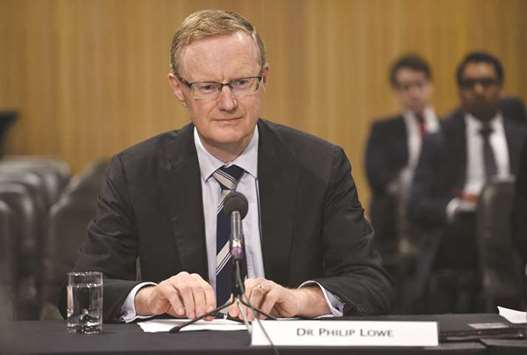Australia’s central bank chief has warned China’s mounting debt poses a grave economic threat, with broadening trade ties between the two countries exposing more industries to the risk.
Total debt has ballooned in China from 100% of gross domestic product (GDP) in the late 1990s to about 260%, with authorities seeking to boost credit and stimulate the economy since exports slowed during the global financial crisis.
China is Australia’s largest trading partner, accounting for close to a third of its exports and about one fifth of imports, and Reserve Bank of Australia chief Philip Lowe is worried.
“Among the largest economic risks that Australia faces is something going wrong in China,” he said during a speech in Sydney on Wednesday evening.
“And perhaps the single biggest risk to the Chinese economy at the moment lies in the financial sector and the big run-up in debt there over the past decade.”
Lowe stressed that economic ties with China run much deeper today than simply resource exports, with tourism, education and agricultural shipments accounting for an increasing share of trade as Australia’s mining boom recedes.
“In many individual categories, we now export more to China than any single other destination,” he said.
“So what happens in China is now directly relevant to a broad spectrum of Australian industries.”
Australia welcomed some 1.4mn Chinese visitors last year, up from about 400,000 a decade earlier.
Close to 200,000 Chinese students currently study in universities Down Under, making up one third of the country’s education exports.
Although Chinese money accounts for just 3% of foreign investment in Australia, Lowe noted it was becoming increasingly diversified as mining tails off.
Wine and dairy exports to China’s burgeoning middle class are on the rise, as are vitamins and pharmaceuticals.
“What happens in China is important to Australia, and to the broader global community,” Lowe said.
With ties between the two countries tense since Canberra launched an inquiry into espionage laws and foreign government interference last year, Lowe appealed for calm. “We will, of course, have differences from time to time, but we will surely be better placed to deal with these if we understand one another well,” he said.
“Building strong connections across business, finance, politics, academia and the community more generally is important to deepening this understanding.”

Reserve Bank of Australia governor Philip Lowe at a parliamentary economics committee hearing in Sydney (file). u201cThe single biggest risk to the Chinese economy at the moment lies in the financial sector and the big run-up in debt there over the past decade,u201d Lowe said on Wednesday.
